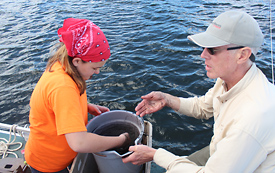On Aug. 11, a dozen U-M staff, recent alumni, and student peer advisers gathered at the Center for Educational Outreach to get on the road to the U-M Biological Station at Douglas Lake. They had a long journey and a lot of work ahead, to prepare for the third annual Camp KinoMaage.
The next day, they greeted 18 campers at KinoMaage, an immersive science and culture camp that encourages college-going among the youth of the Native American tribes of Michigan.

Resident biologist Bob Van de Kopple helps Camp KinoMaage student Cloe Wolverton filter a sample taken from the bottom of Douglas Lake at the U-M Biological Station. Photo by Lauren Jordan.
The weeklong lesson plan included the science of forestry and land, sacred plants and the importance of trees, the role of Native Americans in Michigan, their use of land, including the lands of the Biological Station before it existed; the science of water and water’s role in traditional healing.
Anishinaabemowin (Ojibwe) language, culture, and tradition were woven throughout the week’s activities along with visits from elders, lessons in traditional crafts and their connections to science and culture.
It was a busy, exhausting week for staff, as well as campers, and these comments indicate the campers “gave back” as much to the staff, as the staff invested in them.
Amy Prevo
Assistant director, Center for Educational Outreach
“The great thing about Camp KinoMaage is how it perfectly melds science with Native American art, culture, and language in order to empower kids to want to do great things with their lives.
“One evening activity was to make crafts using thin strips of black ash tree wood. While teaching us how to make the crafts, the facilitator, a tribal elder, shared with us the Anishnaabe legend of how black ash basket making began, and the importance of the craft to the economic survival of the Ojibwe people. She also spoke about the environmental conditions that produce the best tree specimens for use in black ash crafts and how the wood is harvested from various parts of the tree, naming each one in Ojibwe.”
Jeanna Fox
Camp KinoMaage science instructor
“On Wednesday, the students split into two groups: One went on the boat with Bob (Vande Kopple, Biological Station resident biologist) while the other went to the gorge with me. I was happy to see how excited they got about setting up and using ‘real’ science equipment (a niskanbottle, plankton tow and ekman dredge). They came back with a bottle of phytoplankton and everyone wanted to know if they could take it home!
“We went to the gorge to collect a water sample that they will use for their independent research projects. What a wonderful classroom the woods provided. At the end of our trip, the students crossed a small bridge before climbing back out. One boy lingered behind on the bridge and was fumbling through his backpack. He pulled out a small bundle of Ahsayma [tobacco used for sacred purposes] that he opened, and sprinkled into the river as he gave Miigwech (thanks) to Mother Earth for letting him visit today. How special it was for me to witness this spiritual connection. As a teacher, I will carry that moment with me as a reminder of why we do what we do.”
Alphonse Pitawanakwat
Camp KinoMaage Anishinaabemowin instructor; former Anishinaabemowin lecturer, Native American Studies
(Note: Pitawanakwat’s comments are in Anishinaabemowin and translated into English)
“Kina gegoo gii-minabide gaa gii-zhiitaatoowaad Helki Jackson miinwaa gaa naadimaagojin.”
“Everything went well from well-planned preparations coordinated by Helki Jackson and her crew.”
“Wi pii gaa maachtaa’aang, kina Jeanna, netaa kinoomaaged ndaakenjigewin, gii-minabideni gaa zhichiged.”
“From then on, all activities went well including classes conducted by Jeanna Fox, who is truly a professional science teacher.”
“Ngii-minendaagignaa Jeanna, binoojiinhag ge-wiinwaa gii-minendaagigwaan.”
“We all had fun with Jeanna, including the kids.”
“Boksendam miinwaa maanda ji aabiji zhibiwebidagiba.”
“I hope this Camp KinoMaage continues to happen.”

